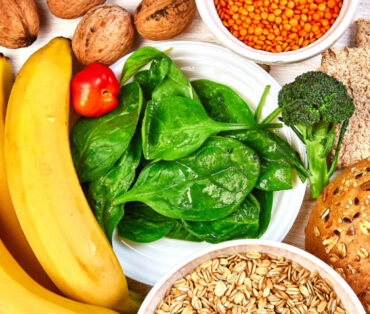The Best & Worst Foods for Gut Health
Trust your gut. Follow your gut instinct. These sayings aren’t without merit. Your gut plays a vital role in your health.
In fact, scientists are learning more about the link between gut microbiome—the microbes in your intestines—and your health every day. For your microbiome to support good health, it must contain the right types and balance of microbes. There are certain types of intestinal bacteria that can do more harm than good and contribute to poor health and the onset of disease. Thankfully, there are gut-healthy foods you can eat and supplements you can take to boost the good bacteria in your gut and improve your overall health. Here’s an overview of what gut health means, why good gut health is important, and the worst and best foods for gut health.
What is Gut Health and Why is it Important?
Your microbiome consists of microbes which are the genetic material found in your small and large intestine. These microbes include bacteria, yeast, fungi, and viruses. There are about 100 trillion of these microbes in your body, and most of them live in your gut.
Scientists now know that the microbiome affects many aspects of health, from digestion to metabolism to mental health. Some gut experts even refer to the microbiome as the “second brain.” 1
When the balance between good and bad microbes tips too far toward bad, you can develop an unhealthy gut, or a condition called gut dysbiosis. Symptoms of an unhealthy gut include bad breath, diarrhea, constipation, bloating, fatigue, sleep problems, and acid reflux.
People with an unhealthy gut are more likely to develop certain chronic health conditions, such as mental health problems, weight gain, diabetes, and inflammatory bowel disease.
Good gut health, on the other hand, helps prevent these chronic diseases and boosts mental health. A healthy gut also gives you the energy to get you through your Curves full body workout, so you can maintain a healthy weight. Therefore, it’s important to do what you can to keep your gut as healthy as possible.
How to Improve Gut Microbiome
There are things you can do to improve your gut health, including the following:
Eat a diverse diet for a diverse microbiome: Consuming a variety of foods rich in various nutrients will help support a healthy microbiome. A healthy gut diet includes nutritious foods that aid in digestion, including whole grains; leafy greens; lean protein sources, such as chicken and fish; avocadoes and other sources of monounsaturated fats; and foods low in sugar and saturated fat.2
Consume fermented foods: Fermented foods are rich in probiotics, which provide new healthy bacteria and fibre that feed existing healthy microbes. Foods with the highest probiotics include the following:
- Fermented gut-healthy drinks, such as kombucha and kefir
- Fermented vegetables—sauerkraut, carrots, green beans, beets, lacto-fermented pickles, kimchi, and traditional cured Greek olives
- Cultured dairy products, such as yoghurt, kefir, and buttermilk
- Cultured nondairy products, such as kefir and yoghurt made from coconut and organic soy
- Grains that have been fermented, such as chickpeas, miso, and lacto-fermented lentils
- Raw apple cider vinegar
- Fermented soybean products, such as tempeh, natto, and miso
Not a fan of any of these foods? You can also take probiotics in supplement form.3
Be proactive with prebiotics: Foods with the highest probiotics help populate microbes in your gut. Prebiotic foods contain ingredients that microbes eat, which boosts fermentation by-products that promote gut health. Foods that contain prebiotics include almonds; asparagus; bananas; barley; garlic; kiwi; legumes; mushrooms; oats; and onions.4
Avoid antibiotics whenever you can: A few decades ago, doctors gave out antibiotics like candy whenever patients had a cough or sniffle. These days, most know better. Studies have shown that overusing antibiotics negatively affects gut health and can have lasting negative effects on the immune system.5
Pony up on polyphenols: Research shows that a healthy gut diet includes food rich in polyphenols.6 As a bonus, polyphenol-rich foods help prevent diabetes, heart disease, and certain cancers. These foods include dark berries such as blackberries and blueberries; nuts; flaxseeds; cocoa powder; herbs and spices, such as peppermint, cloves, oregano, rosemary, sage, and thyme; some vegetables, such as artichokes, red onion, spinach, and shallots; black and green olives; and green tea.7
Engage in a Regular Full Body Workout:
In addition to following a healthy gut diet, engaging in your full body Curves workout can help maintain gut health, too. One study looked at the gut microbes in 19 physically active women compared to 21 sedentary women and found that the active women had higher levels of healthy gut bacteria.8
The Worst Foods for Gut Health
Equally as important as boosting intake of the best foods for gut health is to avoid the worst ones. The foods known to interfere with gut health include the following:
- Alcohol: Drinking more than the recommended amount of alcohol (no more than two drinks per day for a man or one drink a day for a woman) can lead to dysbiosis.9
- Artificial sweeteners: Because they go through the body without being digested, artificial sweeteners can mess with gut health. In a 2021 study, researchers found consuming artificial sweeteners increased two harmful gut bacteria.10 Common sweeteners to avoid include Stevia, aspartame, sucralose, saccharin, and acesulfame K.11
- Processed foods: Highly processed foods that contain salt and additives can harm cut health. These foods include commercial baked goods, like cookies and cakes; processed lunch meats; soft drinks; cured meats; and canned vegetables.
- Red meat: Red meat like steak, pork chops, and bacon contain a compound called L-carnitine, which has a negative effect on gut health. The high fat content of red meat disrupts gut bacteria as well.12
Curves Nutrition Program
In addition to following the above tips, keep in mind that as a member of Curves, you have access to the Curves Nutrition and Weight Management Program. As part of this Program, you will receive advice on the best food for gut health as well as which foods you should avoid.
For more information about Curves, go to www.Curves/about/why-curves
Sources:
- How Your Gut Microbiome Impacts Your Health – Cleveland Clinic
- 5 Foods to Improve Your Digestion | Johns Hopkins Medicine
- 26 Best Foods For A Healthier, Happier Gut (prevention.com)
- 26 Best Foods For A Healthier, Happier Gut (prevention.com)
- Antibiotics as Major Disruptors of Gut Microbiota – PMC (nih.gov)
- Beneficial Effects of Dietary Polyphenols on Gut Microbiota and Strategies to Improve Delivery Efficiency – PMC (nih.gov)
- 8 Foods High in Polyphenols and Why You Need Them (webmd.com)
- Differences in gut microbiota profile between women with active lifestyle and sedentary women | PLOS ONE
- 6 Worst Foods for Gut Health | U.S. News (usnews.com)
- IJMS | Free Full-Text | Artificial Sweeteners Negatively Regulate Pathogenic Characteristics of Two Model Gut Bacteria, E. coli and E. faecalis (mdpi.com)
- 6 Worst Foods for Gut Health | U.S. News (usnews.com)
- 6 Worst Foods for Gut Health | U.S. News (usnews.com)








